Today’s Tech Sightings:

In this undated picture taken from video, a patient uses a robotic hand to drink from a cup, in Badalona, Spain. Scientists have developed a mind-controlled robotic hand that allows people with certain types of spinal injuries to perform everyday tasks. (AP)
How We Got Closer to Our Cyberhuman Future in 2016
There is no escaping the growing symbiosis between man and machine. Writer Kristen V. Brown says we have already become cyborgs in the sense that we are tethered to electronic devices. And she argues that the breakthroughs seen in 2016 have brought people closer to a future where technology and biology could be regularly integrated.
Study: Facebook ‘Lurking’ Could Make You Miserable This Christmas
New research from the California and Virtual Reality Medical Institute found that “regular use of social networking such as Facebook can negatively affect your emotional well-being and satisfaction with life.” Facebook ‘lurkers,’ as the study calls them, miss out on the Christmas family atmosphere and could significantly improve their well-being by taking a break from social media.
RMIT University: Convenience Beats Security With Australian Public Wi-Fi Habits
A study from RMIT University found that up to two million Australians risk being targeted by hackers every time they tap into a public Wi-Fi network to access financial services. In the past three months, at least 10 million people accessed public Wi-Fi networks in Australia, ranked sixth on the international scale of cybersecurity attacks. Up to 60 percent of users knew the public networks were somewhat insecure, but the study found that those who did financial transactions were under the impression that public Wi-Fi networks are relatively secure.
More:
- Seven Mobile Trends to Look for in 2017
- Paytm, India’s Largest Mobile Wallet App, Disappears From App Store
- Canada Declares ‘High-speed’ Internet Essential for Quality of Life
- Governments Are Demanding More and More User Data From Facebook
- EFF Warns Trump Threatens Electronic Rights
- Lithuania: Russian Spyware Found on Government Computers
- How High-tech Toys Are Making Me Rethink Playtime With My Son
- Snapchat Opens Office in China — One of Few Countries Where It’s Banned
